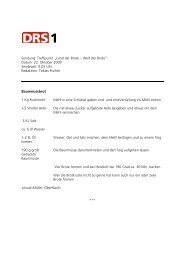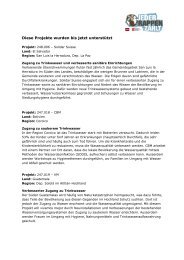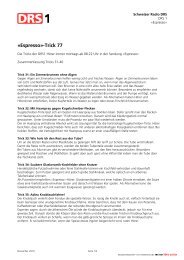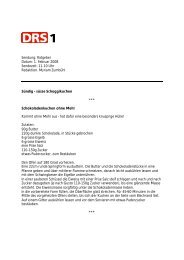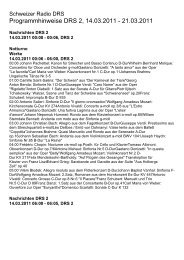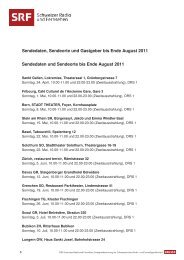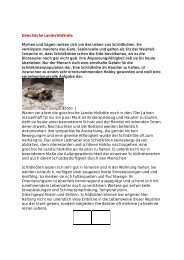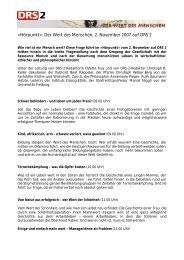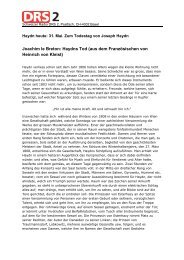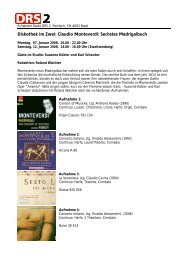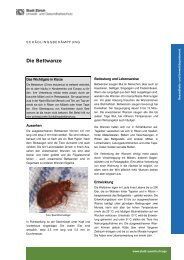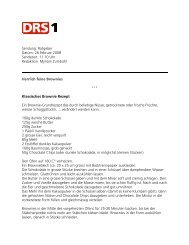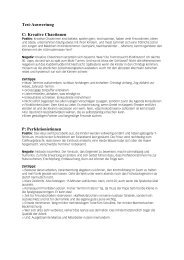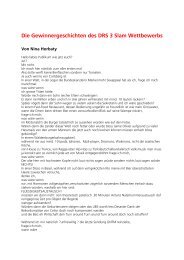12. august – 18. september 2010
12. august – 18. september 2010
12. august – 18. september 2010
Erfolgreiche ePaper selbst erstellen
Machen Sie aus Ihren PDF Publikationen ein blätterbares Flipbook mit unserer einzigartigen Google optimierten e-Paper Software.
libretto within the context of this “rescue” genre. Bouilly was alleged to have<br />
based his libretto on a true story of oppression he had witnessed during the<br />
Reign of Terror, but he changed the setting to the less-incendiary one of Seville.<br />
Yet the original idealism of the French Revolution—before its corruption<br />
into the Terror—resonates through Beethoven’s score with triumphant<br />
force. The trademarks of the “rescue opera” pervade not just Fidelio’s plot<br />
line but its musical texture.<br />
Yet Beethoven’s painstaking quest for the right subject for an opera entailed<br />
far more than a consideration of commercial aspects. For all its stilted qualities,<br />
Bouilly’s original libretto was able to fire up the composer’s imagination<br />
with a sense of musical possibilities. Fidelio enabled him to explore how<br />
such abstract, utopian ideals of the Enlightenment as freedom, brotherhood,<br />
and justice could become catalyzed by a specific, dramatic instance of<br />
self-sacrificing spousal love. The intensity with which such love is represented<br />
underscores the lonely reality that it was all too absent from Beethoven’s<br />
own life.<br />
This interplay of abstract concepts and concrete, dramatic reality—the heart<br />
of the opera’s robust appeal—is what moves us to the depths. Fidelio stands<br />
apart as a special case in Beethoven’s career, yet it also represents a compendium<br />
of his most intimately cherished passions. Here, Beethoven’s belief<br />
in music with a moral purpose influences the musical narrative itself. On one<br />
level, Fidelio is part of a continuum drawing on the composer’s mastery of<br />
instrumental music, as the symphonically complex scoring through which he<br />
delineates the drama makes abundantly clear.<br />
We might even hear Fidelio as the overtly operatic counterpart to the dramatic<br />
narrative implicit in Beethoven’s heroic style. The characters and situations<br />
on stage echo a musical rhetoric we know from its abstract manifestations<br />
as Beethoven them developed in sonata form—above all in his<br />
middle-period symphonic works. In their final, triumphantly loving reunion,<br />
Florestan and Leonore express a “nameless” joy characterized by a uniquely<br />
Beethovenian ecstasy of rough-hewn lyricism and rhythmic excitement.<br />
Following the voice Within<br />
After the rousing heroics of the overture (the most compact of the four, which<br />
trace a parallel history of the opera’s convoluted genesis), the operetta-like<br />
character of the opening scene seems to confuse the sense of genre; here,<br />
the atmosphere suggests Singspiel, as in Mozart’s Magic Flute. Isn’t this round<br />
robin of misaligned affections and mistaken identity out of place in the context<br />
of Fidelio’s elevated moral tone—a bizarre melding of the comic and serious?<br />
Suddenly, with the opera’s first quartet (“Mir ist so wunderbar”), an<br />
unexpectedly elevated tone enters in. (Mahler, one of the great Fidelio interpreters,<br />
would draw on precisely this radiance for the “Adagio” of his Fourth<br />
Symphony.) What is behind all these head-spinning shifts in emotional direction?<br />
Typically, Beethoven seems to be up to several things at once here. The jailor<br />
Rocco’s bourgeois pursuit of security, on behalf of his daughter Marzelline, is<br />
the domestic counterpart to the utopian liberation and reunion of spouses<br />
that occurs in the opera’s climax. But it also grounds Fidelio’s central issues in<br />
a way that proves disturbing. These are decent people pursuing their fair<br />
share of happiness, but in the shadow of an abusive prison system. Evil, we<br />
are reminded, is not so easily singled out as an extreme case that can be eliminated;<br />
it infiltrates into ordinary life in insidious ways. Rocco may be satirized,<br />
yet he has principles and limits. At the same time, he lacks the strength<br />
to resist compromising with the power structure in which he operates.<br />
30 Lorenzo Lotto, Portrait of Messer Marsilio and His Wife<br />
31



